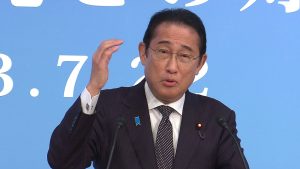Japan’s government is in disarray thanks to an unfolding list of lawmakers who failed to report some of their income in their political fund statements. This week the ruling Liberal Democratic Party (LDP) presented a list of 82 lawmakers, belonging to three different factions, who pocketed millions of dollars in kickbacks from political party fundraising events over a three-year period. The Political Funds Control Act requires all money earned from political activities to be reported.
Prime Minister Kishida Fumio announced a party-wide investigation into the scope of unreported income in response to criticism from the opposition. Kishida pledged to “fulfill necessary accountability.” The LDP has begun interviewing lawmakers from the Abe, Nikai, and Kishida factions and a third-party report will be compiled by the end of the week after reviewing responses from a LDP-wide questionnaire.
The LDP has held power almost continuously since 1955, and the latest scandal exposed a political culture of cover-ups. At the heart of the scandal are allegations that factions returned money from fundraising events that exceeded certain sales quotas back to lawmakers, who then used the money in slush funds without officially disclosing it.
Prosecutors in Japan concluded an investigation in mid-January and filed summary indictments against four members of the Abe faction, namely Takagi Tsuyoshi, former chairman of the LDP’s Diet Affairs Committee; Seko Hiroshige former secretary general of the LDP upper house caucus; Shionoya Ryu, a former education minister; and lawmaker Ikeda Yoshitaka.
But prosecutors stopped short of arresting senior LDP executives. Instead, several senior LDP lawmakers, including heavyweights like former Chief Cabinet Secretary Hirokazu Matsuno, former Minister for Economy, Industry and Trade Nishimura Yasutoshi, former Minister for Internal Affairs Suzuki Junji, and former Minister of Agriculture, Forestry and Fisheries Miyashita Ichiro, stepped down after coming under voluntary questioning All four were removed from their posts by Kishida in December, as the slush fund scandal became public knowledge.
Izumi Kenta, head of the Constitutional Democratic Party of Japan, the main opposition party, slammed prosecutors for choosing to pursue “weak links” rather than lawmakers higher up the political hierarchy. Tamaki Yuichiro from the Democratic Party for the People called for high-ranking politicians to also be subject to punishment, saying, “One reason the public is angry is that only those in charge of accounting are held accountable.”
The scandal has sparked mounting public distrust. A group of citizens and lawyers filed a criminal complaint with the Tokyo district public prosecutor’s office, labeling the scandal a tax evasion case. The group held a press conference last week accusing lawmakers of enjoying impunity. Group representative Fujita Takakage expressed outrage stating how “ordinary citizens would be typically punished while politicians get away with pocketing tens of thousands of dollars without declaring it.” He said he has been hearing complaints from office workers and small business owners across the country.
The opposition says the LDP has not presented a concrete plan forward and questioned Kishida’s leadership, criticizing his promise to “sincerely discuss the issue with each party.” They have been grilling the government for details about how the money was spent and what led to the creation of the slush funds. Four opposition parties called for more efforts to uncover the extent of the income earned illegally and for amendments to the Political Funds Control Act such as abolishing the five-year statute of limitations.
Altogether, the LDP is facing its biggest financial scandal in decades. The opposition has put up a united front during Diet question time. However, there are disagreements over whether there should be more efforts to banish factions entirely and if a special committee should be set up to investigate lawmakers’ political funds and personal income. The Communist Party of Japan called for a ban on corporate and group donations as well as event ticket sales, a key fundraising tactic for factions, stressing that money has the power to distort politics. The Constitutional Democratic Party and the Japan Innovation Party also share the same position.
The opposition is working in tandem to poke holes in the government’s approach to addressing the scandal. The public remains unconvinced and is waiting for the full picture to come to light. It’s an opportunity to sway an unconvinced public toward fundamental reform that holds lawmakers accountable for their actions.

































